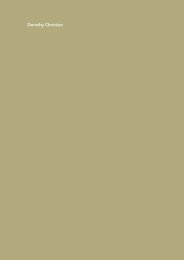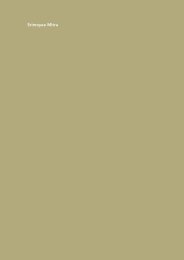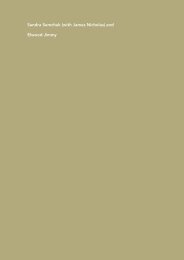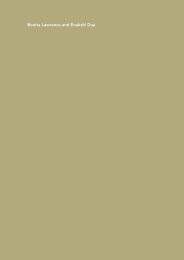Malissa Phung - Speaking My Truth
Malissa Phung - Speaking My Truth
Malissa Phung - Speaking My Truth
You also want an ePaper? Increase the reach of your titles
YUMPU automatically turns print PDFs into web optimized ePapers that Google loves.
the fact that immigrants and refugees are also participants in and beneficiaries<br />
of Canada’s colonial project, especially when they work towards achieving<br />
equality with Canadian settler subjects, thereby placing their political status<br />
above that of Indigenous people in Thobani’s triangulated theory of Canada’s<br />
racial hierarchy.3 But this issue of whether people of colour are settlers<br />
is a complicated one that requires more than just a simple recognition or<br />
acknowledgement that people of colour are complicit settlers. And so, while I<br />
agree with Lawrence and Dua’s central claim that people of colour are settlers, I<br />
have some questions about the implications of this complicated argument.<br />
If people of colour are settlers, then are they settlers in the same way that<br />
the French and British were originally settlers in Canada And what exactly<br />
does being a settler mean Is it a simple descriptive term—settler proper—or<br />
is it a term that carries historical legacies inflected differently by race, class,<br />
gender, sexuality, and ability Is it a unified monolithic subject position Or<br />
can colonial settlerhood be stratified Do different settlers operate on different<br />
levels with regard to access to power What is even more complicated is the<br />
question of mixed race settlers: if all non-Indigenous Canadians are settlers<br />
simply because they or their ancestors migrated to Canada, then what do we<br />
make of settlers who have Indigenous ancestors several generations removed<br />
Can someone who easily passes as a settler choose not to be a settler I admit<br />
these are complicated questions to ask in light of the racist and sexist legacies of<br />
the Indian Act’s marriage laws that used to determine and still does determine<br />
who is and who is not a status “Indian.”<br />
Though I may not have ready answers to these difficult questions, I would<br />
like to begin discussing their implications by questioning whether settlers<br />
of colour can be easily equated with white settlers. I am not disagreeing with<br />
Lawrence and Dua’s main argument; I am not looking for some way to mitigate<br />
the complicity of settlers of colour. Instead I am interested in what a concept<br />
like settler can do, how this concept can recalibrate the methodologies and<br />
epistemologies that anti-racist and anti-colonial academics and activists use to<br />
produce knowledge and shape public discourses in Canada—necessary steps to<br />
consider as we work towards transforming Canadian policies and institutions<br />
to more fully acknowledge and affirm Indigenous claims to national and<br />
cultural independence.<br />
If being a settler simply means being a Canadian, then how are all settlers<br />
equal when not all Canadians are equal Whether a settler is of British or<br />
French or any other European descent, depending on a whole range of factors<br />
(such as time of emigration, mix of racial background and cultural heritage, the<br />
type of English or French accent with which a settler speaks), settlers benefit<br />
292 | <strong>Malissa</strong> <strong>Phung</strong>

















